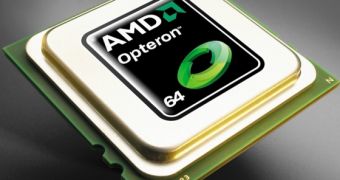We've mentioned this morning that today is the big day for AMD's Shanghai server chip, and we return to the product now to announce the first benchmark test results. As said before, Advanced Micro Devices launched nine flavors of the new chip, all in the 75W area. The already announced new features and technology enhancements the chip comes with have been proved in testing to do what they were meant to do from the beginning: the chip delivers more performance than its predecessors and runs even better than Intel's Xeons.
AMD previously said that the new quad-core Opteron would be more power efficient than its Barcelona chip, and early benchmarking shows exactly this. The Shanghai chip is able to offer a 7W power reduction when idling compared to Barcelona, yet the difference rises up to 49W when side by side with a Xeon CPU. The gain over the predecessor is of only 6 percent, but it jumps considerably to 56 percent when compared to an eight DIMM Intel system and to 30 percent when sided to a four DIMM Intel system.
Even when the processor is loaded, the new Opteron is able to lead on the power efficiency side. It uses around 12 percent less power than Barcelona, and about 27 percent to 46 percent less energy than Intel's chips, depending on the DIMM configuration. When it comes to scalability, it seems that Shanghai is outpaced by Intel's Harpertown, in terms of load points, but it manages to go ahead Barcelona by as much as 25 percent. On an overall scale on CPU loading, the chip manages to remain competitive to the Xeons and even proves around 17 percent to 27 percent more power efficient.
The benchmark tests we've seen were made by the AnandTech news site. According to them, Shanghai manages to keep its place in the competition, compared to Intel's 3.0 GHz Harpertown, when it comes to database workloads. As regards power consumption, the crown goes to the new Opteron chip undoubtedly. As opposed to the Barcelona chip, Shanghai leads by 10 to 15 percent over and above the clock speed difference between the two.
As mentioned a few times before, AMD's Shanghai Opteron processors were packed with a range of new features, including L3 Cache increase, leveraged memory bandwidth, Smart Fetch, along with a bunch of virtualization enhancements. The test system used by the guys from AnandTech featured 2U Supermicro rack mount with H8DMU+ board, 16GB DDR2 800MHz Memory, 1 15.5K Cheetah SAS Drive for OS, while running Windows 2008 Enterprise and SQL 2008 Enterprise.
The test tools used included the Benchmark Factory for Databases, which simulates users and transactions on a database and replays a production or synthetic workload in non-production environments. Also, the AS3AP benchmark was used. According to AnandTech, this "provides the following features: tests database processing power; built-in scalability and portability that tests a broad range of database systems; minimizes effort in implementing and running benchmark tests; provides a uniform metric and straightforward interpretation of benchmark results."

 14 DAY TRIAL //
14 DAY TRIAL //